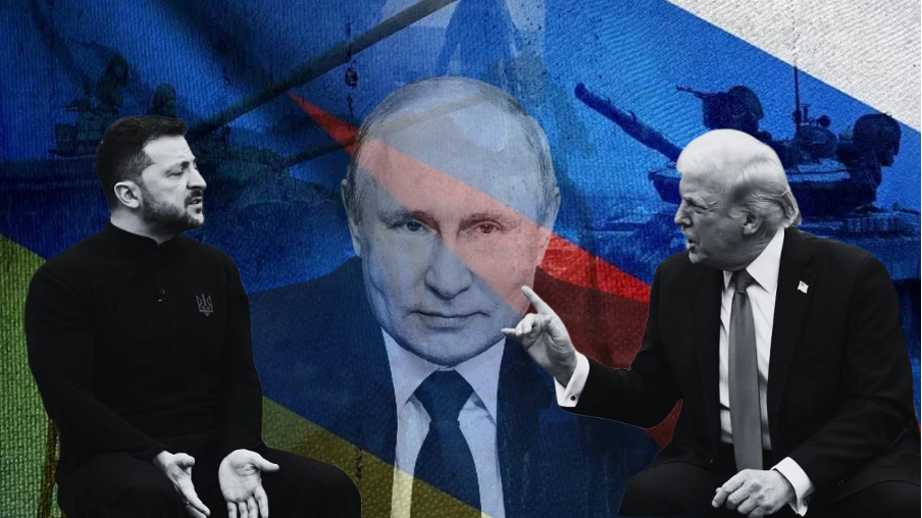Trump-Zelenskyy: Gioco Sporco
Di Alessandro Sbergamo

6 marzo 2025
Tempo di lettura: 5 minuti
English version below
Qualche giorno fa, è accaduto qualcosa di insolito. Il popolo americano e il mondo intero hanno avuto l'opportunità di assistere al dietro le quinte della diplomazia. Il Presidente degli Stati Uniti, Donald Trump, e il Vicepresidente J.D. Vance hanno parlato con il loro omologo ucraino, Volodymyr Zelenskyy, in un incontro aperto alla stampa. Già questo è un fatto piuttosto raro, poiché non è consuetudine che i leader discutano le loro intenzioni davanti ai giornalisti, i quali hanno colto al volo l'occasione per intensificare le tensioni. Ciò che ha davvero scioccato il mondo sono stati gli ultimi dieci minuti dell'incontro, quando si è trasformato in uno scambio acceso tra quelli che dovrebbero essere partner strategici. Una diplomazia orribile per alcuni, un taglio netto alle formalità per altri, ma indubbiamente un momento memorabile che, nelle parole di Trump:
“Sarà un grande spettacolo televisivo”.
Cosa ha fatto infuriare Trump e Vance?
L'elemento scatenante della tensione durante la “negoziazione” è stato chiarissimo. Zelenskyy, guardando Vance dritto negli occhi, gli ha chiesto: “Che tipo di diplomazia?”, implicando pesantemente che con Putin non possa esserci alcun vero negoziato su questa questione. Ecco, ha aperto il vaso di Pandora.
In breve, il Presidente ucraino ha ricordato a Vance e Trump che Putin ha violato il cessate il fuoco in molteplici occasioni, che è un dittatore terrorista e che gli Stati Uniti subiranno direttamente le conseguenze della Russia se questa non verrà fermata. Questo è stato percepito come una minaccia velata dai due americani. A quel punto, Vance è esploso, accusando Zelenskyy di mancanza di gratitudine verso gli Stati Uniti, e Trump lo ha redarguito con tre affermazioni ormai celebri (o infami):
1. “Al momento, non ti trovi in una posizione favorevole. Ti sei lasciato mettere in una situazione molto difficile.”
2. “Non sei in una buona posizione. In questo momento, non hai le carte in mano. Con noi, puoi iniziare ad averle.”
3. Infine, la più brutale: “Stai giocando a carte. Stai scommettendo con la vita di milioni di persone. Stai scommettendo con la Terza Guerra Mondiale.”
L'analisi di Marco Rubio
Marco Rubio era presente all'incontro e ha rilasciato un'intervista alla CNN su quanto accaduto. Questo è un dettaglio rilevante, poiché fornisce una prospettiva diretta sui retroscena della discussione.
Ha fortemente insinuato in più occasioni che era stato detto a Zelenskyy di non ricorrere ad attacchi personali contro Putin, ma di concentrarsi sull'accordo e sulle trattative. Di fatto, l'obiettivo principale di Trump era la firma di un accordo che avrebbe garantito agli Stati Uniti risorse minerarie rare per un valore di 500 miliardi di dollari in cambio di garanzie di sicurezza per l'Ucraina. In passato, Rubio aveva definito Putin in molti modi poco lusinghieri, eppure, in questa intervista, ha scelto di rimanere neutrale, sottolineando che il suo ruolo di Segretario di Stato è porre fine alla guerra, non esprimere giudizi personali su Putin.
Ciò che emerge dall'amministrazione Trump è che la negoziazione e il compromesso sono prioritari su tutto, persino sulla giustizia. Secondo Rubio, quindi, sembra che Zelenskyy fosse stato avvisato su cosa non dire, eppure ha scelto di ignorarlo. Se questa ipotesi fosse vera, sarebbe perfettamente logico comprendere il motivo della reazione di Trump e Vance. In ogni caso, non è stato un bello spettacolo per il mondo intero.
Le possibili cause del fraintendimento
Ritengo che vi siano due problemi principali. Primo, la lingua madre di Zelenskyy non è l'inglese, e ciò inevitabilmente influisce sulla negoziazione. Il tono, la scelta delle parole e il vocabolario giocano un ruolo cruciale. Forse il Presidente ucraino intendeva esprimere un concetto in un modo, ma è stato interpretato diversamente. Secondo, e ancor più rilevante, potrebbe esserci stato un malinteso o una mancanza di chiarezza. Trump ha chiarito (e Rubio lo ha poi confermato) che la garanzia di sicurezza include, tra le altre cose, la presenza militare americana in Ucraina. L'idea era che, legando ulteriormente le due economie e aumentando la presenza di personale americano, Putin avrebbe riflettuto due volte prima di attaccare di nuovo. Tuttavia, questo o non è stato sufficiente per Zelenskyy, o non gli è stato spiegato con chiarezza.
Politica, diplomazia e affari
Ecco il problema. La politica fra loro è stata condotta secondo premesse di business, sotto la maschera della diplomazia.
Infatti, Trump stava conducendo un business per gli interessi Americani, invece Zelenskyy stava facendo diplomazia per la sicurezza del proprio paese. Il risultato è stata una sporca politica, quella che vediamo fare dai nostri politici e non dai elite internazionali. Eppure, credo che questo sia un momento importante per comprendere che la diplomazia non è solo sorrisi, parole eleganti e palazzi sontuosi. La diplomazia può anche essere politica, in cui i leader litigano come persone comuni. Quante trattative sono andate in questo modo senza che nessuno lo sapesse?
Sembra quindi che, se Zelenskyy vuole trattare con Trump, debba essere più pragmatico e meno idealista. L'adesione dell'Ucraina alla NATO è un obiettivo idealistico, così come lo è il rifiuto di cedere territori alla Russia. Tutti concordano sul fatto che lui sia la vittima e Putin l'aggressore, ma la verità da sola non lo porterà lontano nei negoziati.
La strategia di Zelenskyy deve cambiare. Per negoziare con Trump, deve abbandonare gli attacchi personali contro Putin e accettare compromessi sia con gli Stati Uniti - che, sotto Trump, non sono alleati dell'Ucraina ma mediatori con interessi propri- sia con la Russia. Altrimenti, la guerra continuerà. La fredda e dura realtà è che deve dare priorità ai risultati realistici, ahimè non a quelli giusti e equi.
Trump-Zelenskyy:
The Gloves are off
By Alessandro Sbergamo
March 6th, 2025
Reading time: 5 minutes
A few days ago, something unusual has happened. The American people and the whole world got to see the behind the scenes of diplomacy. President of the United States Donald Trump and Vice President J.D. Vance spoke with the Ukrainian counterpart, Volodymyr Zelenskyy, in an open-to-the-press sitting. This is already fairly unusual, since, it is not common place for leaders to exchange intentions in front of reporters – who seized the chance to heighten tensions. What truly shocked the world were the last ten minutes of the sitting where it turned into a fiery exchange between presumably strategic partners. Horrendous diplomacy for some, cutting the slack-diplomacy for others, this was truly a memorable moment and, in Trump’s words:“This will make for great television”.
What angered Trump and Vance?
The straw that broke the camel’s back during the “negotiation” was clear as day. That’s when Zelesnkyy, while looking directly into Vance’s eyes, asked him “What kind of diplomacy?”, heavily implying that with Putin there cannot be any real negotation for this matter. That was it, he opened pandora’s box.
In short, the Ukrainian President reminded to Vance and Trump that Putin broke the ceasefire on multiple occasions, that he is a terrorist dictator, while also telling them that the US will feel the direct effects of Russia if left unchecked. This was perceived as a veiled threat by the two. Hence, Vance erupted in remarks pointing out Zelenskyy’s alleged lack of gratitude towards the US, leading Trump to scold him with the now famous (or infamous) 3 hard-hitting remarks:“You’re, right now, not in a very good position. You’ve allowed yourself to be in a very bad position.”“You’re not in a good position. You don’t have the cards right now. With us, you start having cards.”And finally, the brutal “You’re playing cards. You’re gambling with the lives of millions of people. You’re gambling with World War III.”
Marco Rubio’s insight
Marco Rubio was present at the event, and he gave CNN an interview on what just happened. This is worth mentioning because he gives direct insight on the pre-litigation.
He heavily implied in multiple instances that it was told to Zelenskyy that they should not use ad-hominem on Putin, but focus on the deal and open negotiations. As a matter of fact Trump’s focus was the signing of the deal where Ukraine would give the equivalent of $500B rare earth minerals to the US, in exchange for security. Rubio has given past remarks where he called Putin all kinds of name, yet, in this interview he chose to remain neutral by noting that his job as Secretary of State is to end the war, not to give personal emotional remarks on Putin.
What transpires from the Trump administration is that negotiation and compromise are above anything else, even justice.
Hence, according to Rubio, it appears that Zelesnkyy was briefed on what not to say, and yet he chose not to respect this. Assuming this is true, then it makes perfect logical sense why Trump and Vance would get altered. In any case, it definitely was not a great show for the world.
I suspect that there have been two major issues. Firstly, that Zelenskyy’s native language is not English, and this does inevitably play a role during negotation. Tone, word choice, vocabulary, all play a role in their own way. Perhaps, Ukraine’s President meant to be understood in a way while he was understood in another. Secondly, rather very importantly, is a potential misunderstanding or lack of clarification. Essentially Trump made it clear (later confirmed by Rubio) that the security guarantee, among others, is American presence on Ukrainian soil. By further binding the two economies and having more American manpower, their logic is that Putin would think twice before attacking once again. Yet, this is either not enough for Zelesnkyy or it wasn’t clear to him.
Politics, Diplomacy and Business
This is the problem. Politics was being conducted under business premises under the facade of diplomacy.
Trump was conducting business, Zelenskyy was conducting diplomacy. The result was politics. I believe this was an important moment were many people should understand that diplomacy isn’t only smiling faces, eloquent words in shiny palaces. Diplomacy can also be politics, dirty politics, where politicians argue like normal people. How many negotiating processes have gone this way and it will never be known?
Vance was mostly cordial, except when he went fully aggressive near the end. Trump was mostly serious and joking – even complimenting Zelenskyy on his clothes and patting him on the back, yet he later kicked out of the White House the Ukrainian President. Zelenskyy was mostly cordial and honest, honesty that cost him the deal (for now). Once again, the clash occurred because the American leaders were dealing in business terms, while the Ukranian one was dealing in diplomatic terms. It would seem that if Zelesnkyy wants to deal with Trump, he has to be more pragmatic and less idealistic. Ukraine joining NATO is idealistic, and not ceding some land to Russia also seems so. Everyone agrees that he is the victim, that Putin is the aggressor, but the truth won’t bring him far in negotiations.
Zelesnkyy strategy should change. To negotiate with Trump, he must quit the ad-hominems to Putin while also concede and compromise to both the US – who under Trump is not Ukraine’s ally, but a mediator with interests– and Russia. Otherwise, the war will continue. The cold harsh reality is that he has to prioritize realistic outcomes, unfortunately not just and fair ones.
Alessandro Sbergamo
Alessandro è dotato di una solida base in relazioni internazionali, grazie al conseguimento della laurea triennale in “PPE” (Politics: Philosophy and Economics) presso l'Università LUISS e al Master in International Relations che sta attualmente svolgendo presso lo University College Dublin. Il suo percorso accademico, arricchito dalla ricerca extracurriculare che lo accompagna quotidianamente, riflette un profondo interesse per le complessità delle relazioni geopolitiche e di politica estera. Questa passione alimenta il suo rigore nel potenziare sempre di più le sue conoscenze e skill in questa area di studio.

